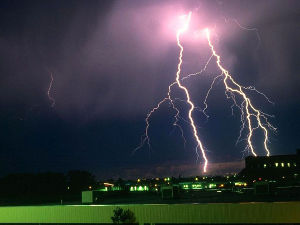Verbos defectivos en español

Siempre relampaguea mucho antes de la tormenta.
It always flashes long before the storm.
There are many categories of Spanish verbs as you can see in our different webpages. This lesson will focus on verbs that are called “defective” or “incomplete” because they do not have all the personal forms or tenses as most verbs do. On this page you will learn which are the most common defective verbs, and about two subcategories: impersonal and bipersonal verbs. Use the exercise below to practice the use of defective verbs in Spanish.
In general, defective verbs do not have complete conjugation due to the fact that they lack some personal forms or some tenses.
These verbs are only conjugated in the third person singular form, and in general they refer to nature and weather.
| Infinitive | Conjugated verb in the present tense |
Conjugated verb in the past tense |
English translation |
|---|---|---|---|
| Haber | Hay | Hubo | There is/are. There was/were. |
| Llover | Llueve | Llovió | It's rainy. It rained. |
| Nevar | Nieva | Nevó | It's snowing. It snowed. |
| Amanecer | Amanece | Amaneció | To rise (the sun) |
| Atardecer | Atardece | Atardeció | To get dark. (opposite of “amanecer”). |
| Tronar | Truena | Tronó | To thunder |
| Relampaguear | Relampaguea | Relampagueó | To flash |
These verbs are only conjugated in the third person singular and the plural.
| Infinitive | Conjugated verb in the present tense |
Conjugated verb in the past tense |
English translation |
|---|---|---|---|
| Acaecer | Acaece | Acaeció | To happen |
| Acontecer | Acontece | Aconteció | To happen |
| Atañer | Atañe | Atañió | To have to do with |
| Suceder | Sucede | Sucedió | To happen |
There are some other defective verbs that don't fall into either of the above categories. Here you have some examples:
Write the correct form of each verb in the present tense or the preterite tense.
1. Ayer (relampaguear)
 mucho,pero no (llover)
mucho,pero no (llover)
 .
.
2. En estos días (anochecer)
 rápido.
rápido.
3. Ellos (soler)
 visitar a su familia cada semana.
visitar a su familia cada semana.
4. El fin de semana pasado (ocurrir)
 un evento único.
un evento único.
5. Aquí no (nevar) nunca. Nunca

6. (Acaecer)
 en aquellos días una gran sequía.
en aquellos días una gran sequía.
7. En aquellos tiempos (acontecer)
 un milagro.
un milagro.
8. Siempre que (amanecer)
 puedo escuchar el canto de los pájaros.
puedo escuchar el canto de los pájaros.
9. Me da miedo cuando (tronar)
 mucho durante la tormenta.
mucho durante la tormenta.
10. Esa información no te (atañer)
 a ti.
a ti.
Click below to register for a free class with no obligation - no credit card needed.